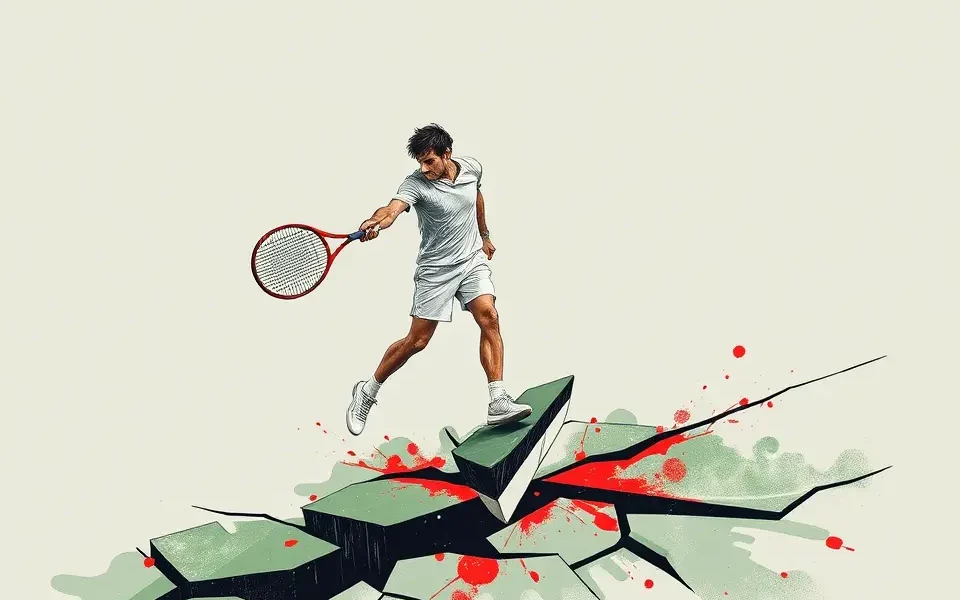The demanding nature of the professional tennis circuit has recently become a hot topic, with prominent players Carlos Alcaraz and Iga Swiatek voicing concerns about the toll that the rigorous schedule takes on their bodies and minds. However, their sentiments have been met with a contrasting viewpoint from former British No. 1 Dan Evans, sparking a debate within the tennis community about the realities and responsibilities of being a professional athlete.
Alcaraz and Swiatek’s Concerns
Carlos Alcaraz and Iga Swiatek have both been vocal about the challenges posed by the packed tennis calendar. Alcaraz, the young Spanish sensation, expressed his worries at the end of 2024 about the increasing number of mandatory tournaments, fearing potential injuries. Swiatek echoed these concerns after an early loss in Dubai, stating that the relentless schedule would prevent players from maintaining a high level of performance consistently over many years. She highlighted the constant need to switch continents, surfaces, and even balls, adding to the physical and mental strain.
Alcaraz’s Meteoric Rise and Scheduling Concerns
Carlos Alcaraz’s rise to the top of the tennis world has been nothing short of spectacular. In 2024, he captured two Grand Slam titles, winning the French Open and Wimbledon, while also securing a silver medal at the Paris Olympics. These accomplishments underscore his exceptional talent and dedication. However, even amidst such success, Alcaraz has voiced concerns about the demanding nature of the tennis calendar. He suggests that the increasing number of mandatory tournaments could lead to more injuries, potentially shortening players’ careers.
Swiatek’s Perspective on the Hectic Tour
Iga Swiatek, a dominant force in women’s tennis, has also been outspoken about the challenges presented by the grueling tour schedule. After an unexpected defeat at the Dubai Duty-Free Tennis Championships, Swiatek pointed to the relentless nature of the calendar as a contributing factor. She emphasized the constant need to adapt to different surfaces, continents, and balls, which places immense pressure on players’ bodies and minds. Swiatek’s concerns reflect a broader discussion within the WTA about the sustainability of the current tour structure and its impact on player well-being.
Dan Evans’ Rebuttal
Dan Evans, a seasoned British player, offered a different perspective on the matter. In an interview with the BBC, Evans acknowledged that while the schedule is demanding, players are in a fortunate position and have the autonomy to take weeks off. He argued that players should be grateful for their busy schedules, especially considering that many people worldwide struggle to find work. Evans’ comments have ignited discussion, highlighting a divide between established players and those lower in the rankings who may view the tour through a different lens.
Evans’ Career and Perspective
Dan Evans has been a professional tennis player since 2006, achieving a career-high ranking of No. 21 in the world in August 2023. He has won two ATP titles, the Murray River Open in 2021 and the ATP 500 Washington Open in 2023. His perspective is rooted in years of experience on the tour, navigating its challenges and embracing the opportunities it provides.
Garbine Muguruza’s View
Adding another layer to the debate, two-time Grand Slam champion Garbine Muguruza has also weighed in, advocating for players to take ownership of their schedules. She believes that the multitude of tournaments presents ample opportunities for players to overcome self-doubt and achieve peak performance.
The Broader Debate
The contrasting opinions of Alcaraz and Swiatek versus Evans and Muguruza shed light on a more extensive discussion about the realities of professional tennis. Factors such as mandatory tournaments, the physical demands of constant travel, and the pressure to perform consistently contribute to the debate.
Player Well-being
One of the central arguments made by Alcaraz and Swiatek revolves around player well-being. The constant strain on the body and mind can lead to injuries and burnout, potentially shortening careers. Finding a balance between competition and recovery is crucial for long-term success.
Economic Considerations
Economic considerations also play a significant role. Players often feel compelled to participate in numerous tournaments to maintain their ranking, secure prize money, and fulfill sponsorship obligations. This financial pressure can override concerns about physical and mental health.
Tournament Structure
The structure of the ATP and WTA tours also influences the debate. Mandatory tournaments and the distribution of ranking points can incentivize players to compete even when they may need rest. Re-evaluating the tour structure to prioritize player well-being could be a potential solution.
The Numbers Behind the Schedule
While Alcaraz and Swiatek have expressed concerns about the tour’s intensity, statistics reveal that they may not be the busiest players on the circuit. In 2024, Alcaraz played 62 matches, ranking him 15th among his peers. Alexander Zverev topped the list with 83 matches, followed by Jannik Sinner with 76. These figures suggest that perceptions of the schedule’s demands can vary among players.
A Crossroads for Tennis
As the tennis world prepares for Wimbledon, the debate over the tour schedule continues to resonate. The differing viewpoints highlight the complexities of professional tennis, where athletes must balance their physical and mental health with economic realities and competitive aspirations. Whether players choose to embrace the grind or advocate for reform, how they navigate these challenges will ultimately shape their careers and the future of the sport.
The debate surrounding the tennis schedule underscores the diverse perspectives within the sport. While stars like Alcaraz and Swiatek raise concerns about player well-being, veterans like Evans and Muguruza emphasize personal responsibility and gratitude. As the discussion continues, finding a balance that supports both player health and the integrity of the competition will be crucial for the long-term success of professional tennis.








No Comment! Be the first one.